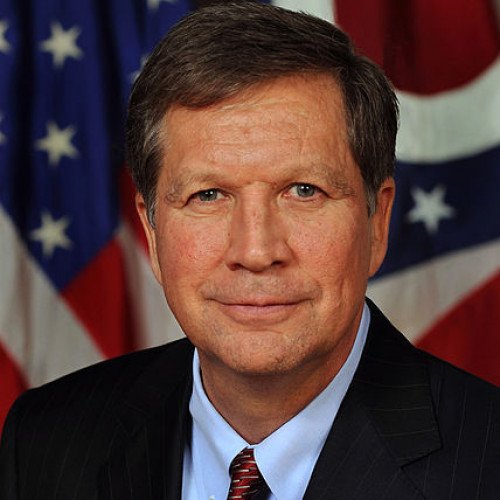Barry Goldwater VS John Kasich

Barry Goldwater
Barry Morris Goldwater (January 2, 1909 – May 29, 1998) was an American politician, businessman, and author who was a five-term Senator from Arizona (1953–1965, 1969–1987) and the Republican Party nominee for president of the United States in 1964. Despite his loss of the 1964 presidential election in a landslide, Goldwater is the politician most often credited with having sparked the resurgence of the American conservative political movement in the 1960s. He also had a substantial impact on the libertarian movement.Goldwater rejected the legacy of the New Deal and, along with the conservative coalition, fought against the New Deal coalition. A member of the NAACP and active supporter of desegregation in Phoenix, Goldwater voted in favor of the Civil Rights Act of 1957 and the 24th Amendment to the U.S. Constitution, but opposed the Civil Rights Act of 1964, believing it to be an overreach by the federal government—a decision that considerably anguished him. In 1964, Goldwater mobilized a large conservative constituency to win the hard-fought Republican presidential primaries. Although raised as an Episcopalian, Goldwater was the first candidate of ethnically Jewish heritage to be nominated for President by a major American party (his father was Jewish). Goldwater's platform ultimately failed to gain the support of the electorate and he lost the 1964 presidential election to incumbent Democrat Lyndon B. Johnson by one of the largest margins in history. Goldwater returned to the Senate in 1969 and specialized in defense and foreign policy. As an elder statesman of the party, Goldwater successfully urged President Richard Nixon to resign in 1974 when evidence of a cover-up in the Watergate scandal became overwhelming and impeachment was imminent. Goldwater narrowly won re-election in 1980 for what would be his final and most influential term in the senate. In 1986, Goldwater oversaw passage of the Goldwater–Nichols Act, arguably his most significant legislative achievement, which strengthened civilian authority in the Department of Defense. The following year, he retired from the Senate and was succeeded by John McCain, who praised his predecessor as the man who "transformed the Republican Party from an Eastern elitist organization to the breeding ground for the election of Ronald Reagan". Goldwater strongly supported the 1980 presidential campaign of Reagan, who had become the standard-bearer of the conservative movement after his "A Time for Choosing" speech. Reagan reflected many of the principles of Goldwater's earlier run in his campaign. The Washington Post columnist George Will took note of this, writing: "We [...] who voted for him in 1964 believe he won, it just took 16 years to count the votes". Goldwater's views grew increasingly libertarian as he neared the end of his career. After leaving the Senate, Goldwater's views cemented as libertarian. He criticized the "moneymaking ventures by fellows like Pat Robertson and others [in the Republican Party] who are trying to... make a religious organization out of it." He lobbied for homosexuals to be able to serve openly in the military, opposed the Clinton administration's plan for health care reform, supported abortion rights, and the legalization of medicinal marijuana.
Statistics for this Xoptio

John Kasich
John Richard Kasich Jr. ( KAY-sik; born May 13, 1952) is an American politician, author, and television news host who served in the U.S. House of Representatives from 1983 to 2001 and as the 69th Governor of Ohio from 2011 to 2019. A Republican, Kasich unsuccessfully sought his party's presidential nomination in 2000 and 2016.Kasich grew up in McKees Rocks, Pennsylvania, moving to Ohio to attend college. After a single term in the Ohio Senate, he served nine terms as a member of the United States House of Representatives from Ohio's 12th congressional district. His tenure in the House included 18 years on the House Armed Services Committee and six years as chairman of the House Budget Committee. Kasich was a key figure in the passage of both 1996 welfare reform legislation and the Balanced Budget Act of 1997. Kasich decided not to run for re-election in 2000 and ran for president instead. He withdrew from the race before the Republican primaries. After leaving Congress, Kasich hosted Heartland with John Kasich on Fox News from 2001 to 2007 and served as managing director of the Lehman Brothers office in Columbus, Ohio. He ran for governor of Ohio in 2010, defeating Democratic incumbent Ted Strickland. He was re-elected in 2014, defeating Democratic challenger Ed FitzGerald by 30 percentage points. Kasich was term-limited and could not seek a third gubernatorial term in 2018; he was succeeded by Mike DeWine. Kasich ran for president again in 2016, finishing in third place in the Republican primaries behind Donald Trump and Ted Cruz. He won the primary in his home state of Ohio and finished second in New Hampshire. Kasich declined to support Trump as the Republican presidential nominee and did not attend the 2016 Republican National Convention, which was held in Ohio. In 2019, following the end of his second term as governor, Kasich joined CNN as a contributor. Kasich is known as one of the most prominent critics of Trump within the Republican Party, and he endorsed Democratic presidential nominee Joe Biden for president in a speech at the 2020 Democratic National Convention.